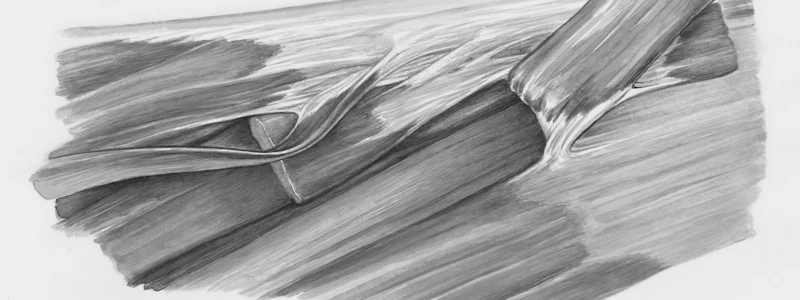Podcast
Questions and Answers
What are 4 types of tissue?
What are 4 types of tissue?
Connective, Epithelial, Muscle, Nerve
Which bones make up the axial skeleton?
Which bones make up the axial skeleton?
Cranium, Ribs, Sternum, Vertebrae
What are 3 kinds of muscle?
What are 3 kinds of muscle?
Skeletal, Smooth, Cardiac
What are three parts of the nervous system?
What are three parts of the nervous system?
What are the five main senses?
What are the five main senses?
What are some parts of the digestive system?
What are some parts of the digestive system?
What are four parts of the excretory system?
What are four parts of the excretory system?
What are six parts of the circulatory system?
What are six parts of the circulatory system?
What are four parts of the lymph system?
What are four parts of the lymph system?
What are some parts of the respiratory system?
What are some parts of the respiratory system?
What is your endocrine system?
What is your endocrine system?
What are the major purposes of blood?
What are the major purposes of blood?
What is the atomic number?
What is the atomic number?
What is an element?
What is an element?
What are some parts of an atom?
What are some parts of an atom?
Match the following elements with their mass:
Match the following elements with their mass:
What do the heavens declare?
What do the heavens declare?
What is the theory of evolution?
What is the theory of evolution?
What is uniformitarianism?
What is uniformitarianism?
What is catastrophism?
What is catastrophism?
What is natural selection?
What is natural selection?
What is good science?
What is good science?
Study Notes
Types of Tissue
- Four types of human tissue: Connective, Epithelial, Muscle, and Nerve.
Axial Skeleton
- Components of the axial skeleton include: Cranium, Ribs, Sternum, and Vertebrae.
Muscle Types
- Three kinds of muscle: Skeletal, Smooth, and Cardiac.
Nervous System Parts
- The nervous system is made up of the Brain, Spinal Cord, and Nerves.
Senses
- Five main senses are: Sight, Hearing, Taste, Smell, and Touch.
Digestive System
- Key parts of the digestive system: Mouth, Esophagus, Stomach, Liver, Small Intestine, and Large Intestine.
Excretory System
- Four parts of the excretory system include: Urinary Tract, Lungs, Skin, and Intestines.
Circulatory System
- Six essential components of the circulatory system: Heart, Arteries, Veins, Capillaries, Red and White Blood Cells, and Platelets.
Lymphatic System
- Four main components of the lymphatic system: Lymph vessels, Lymph nodes, Spleen, and Thymus.
Respiratory System
- Parts of the respiratory system include: Nose, Pharynx, Larynx, Trachea, Bronchi, Bronchioles, Alveoli, and Lungs.
Endocrine System
- The endocrine system consists of glands and organs that use hormones to communicate through the bloodstream.
Blood Functions
- Major purposes of blood include: Transportation, Protection, Communication, and Temperature regulation.
Atomic Number
- The atomic number is defined as the number of protons in an atom's nucleus, which equals the electron count in a neutral atom.
Element Definition
- An element is a fundamental chemical substance characterized by its atomic number and atomic mass.
Parts of an Atom
- Key components of an atom: Nucleus, Protons, Electrons, Quarks, Leptons, and Neutrons.
Periodic Table Elements
- First four elements:
- 1 - Hydrogen (H) with mass 1
- 2 - Helium (He) with mass 4
- 3 - Lithium (Li) with mass 7
- 4 - Beryllium (Be) with mass 9
Additional Periodic Table Elements
-
Second four elements:
- 5 - Boron (B) with mass 11
- 6 - Carbon (C) with mass 12
- 7 - Nitrogen (N) with mass 14
- 8 - Oxygen (O) with mass 16
-
Third four elements:
- 9 - Fluorine (F) with mass 19
- 10 - Neon (Ne) with mass 20
- 11 - Sodium (Na) with mass 23
- 12 - Magnesium (Mg) with mass 24
Theological Reference
- "The heavens declare the glory of God; the skies proclaim the works of His hands.” - Psalm 10:1.
Evolution Theory
- The theory of evolution posits that life originated from a random combination of non-living substances.
Uniformitarianism
- A geological concept asserting that past environmental changes on Earth can be explained by current natural processes.
Catastrophism
- The belief that Earth's geological changes were primarily caused by sudden, violent events.
Natural Selection
- A principle where only the fittest organisms survive and transmit their advantageous traits to future generations.
Good Science
- Good science embodies the continuous search for accurate and reliable information.
Studying That Suits You
Use AI to generate personalized quizzes and flashcards to suit your learning preferences.
Description
Test your knowledge on the fundamental concepts of human anatomy and tissue types with this quiz. Covering topics from types of tissue to the skeletal and muscular systems, it's perfect for reinforcing your understanding of basic biological principles. Ideal for students engaged in Classical Conversations Cycle 3.




